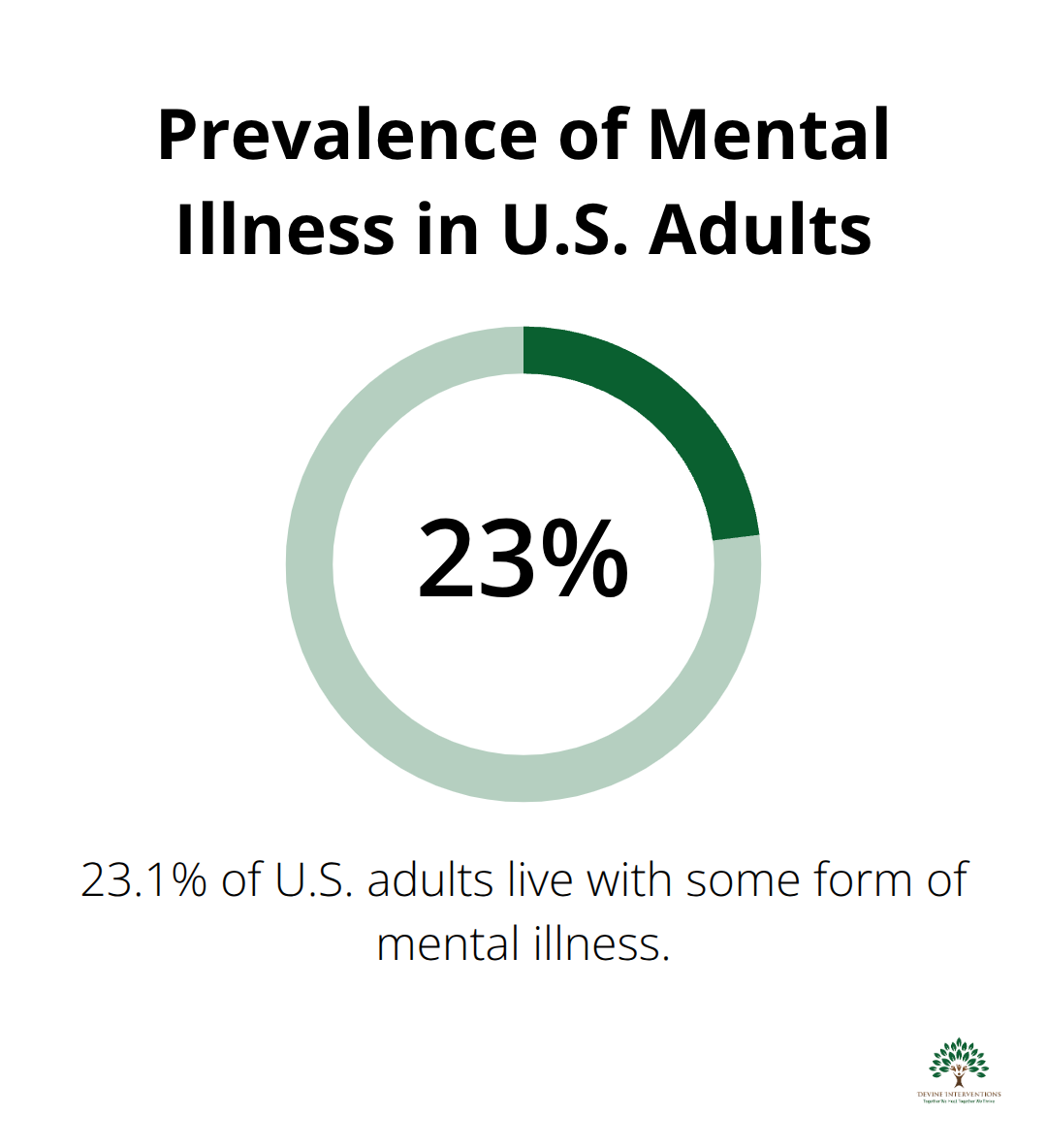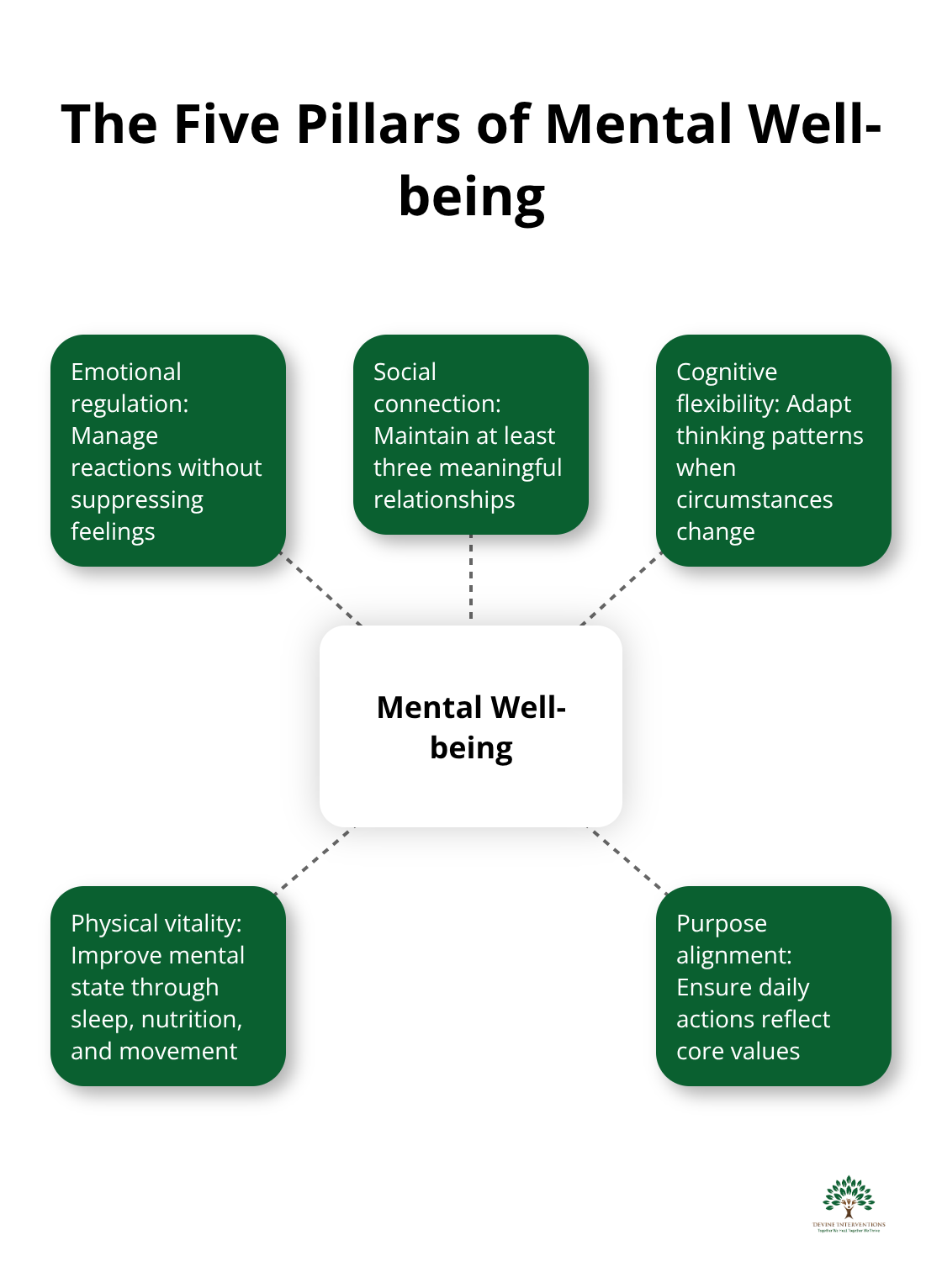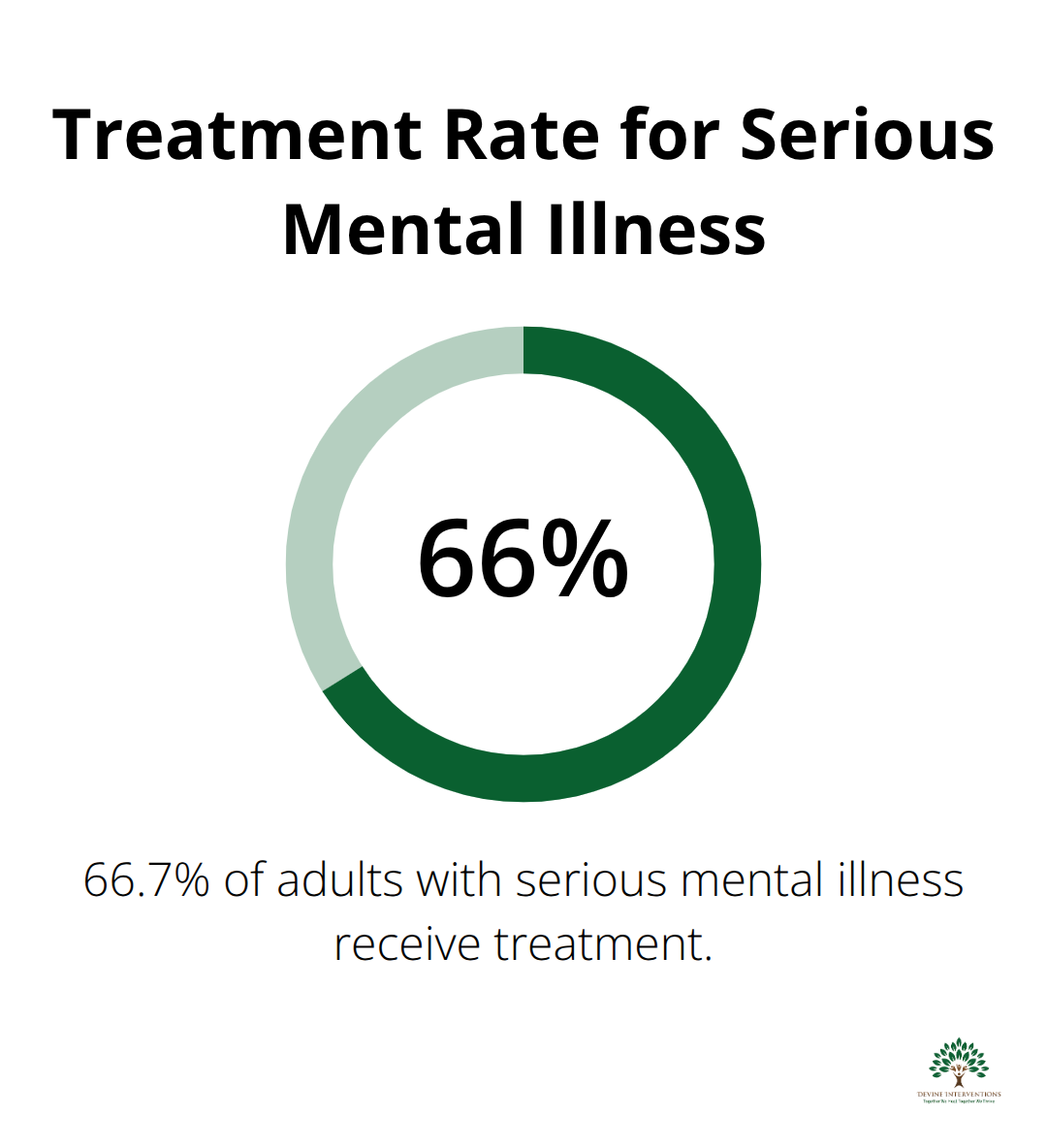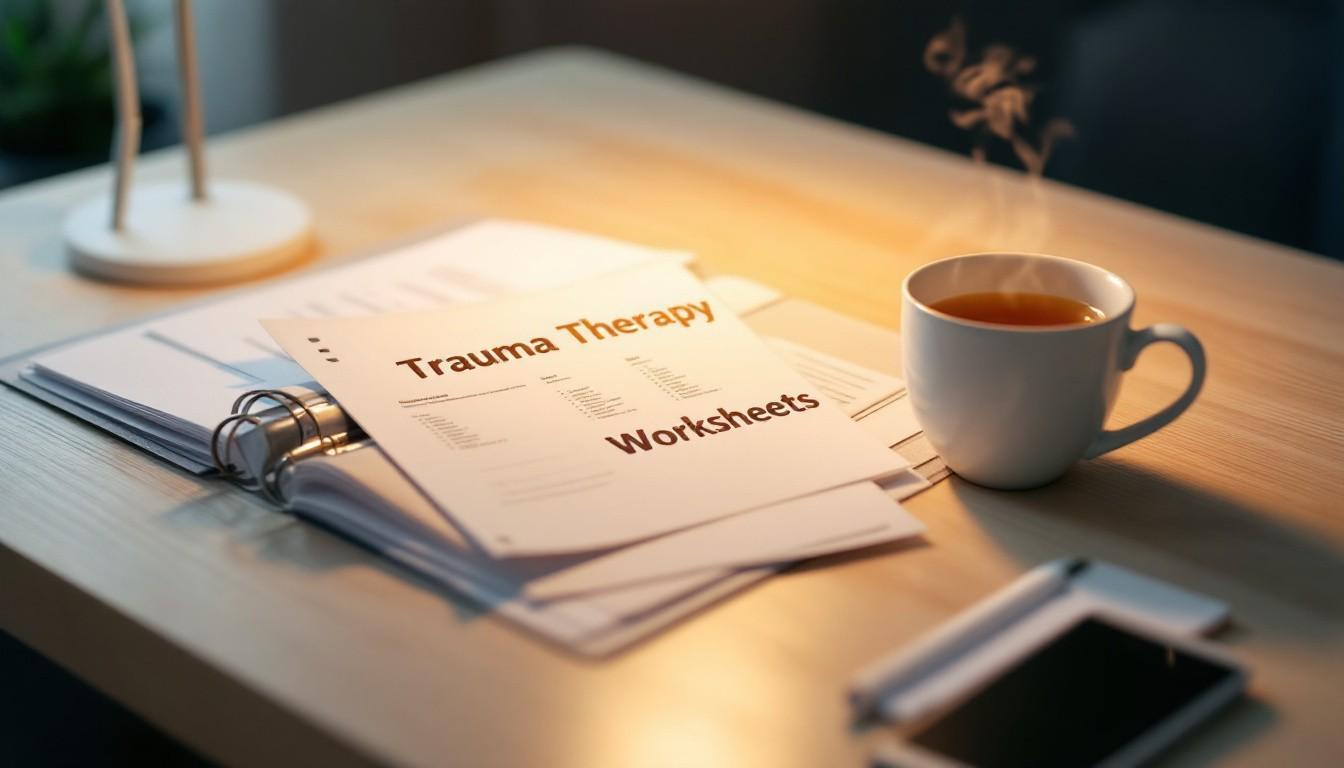Mental health knowledge shapes how we care for ourselves and support others. Many people struggle with basic concepts about psychological well-being.
We at Devine Interventions created this mental wellness basics quiz to test your understanding of fundamental principles. The answers reveal common gaps in mental health awareness that affect daily decisions about self-care and seeking help.
Understanding Mental Wellness Fundamentals
Mental health represents your psychological state at any given moment, while mental illness refers to diagnosable conditions that significantly disrupt daily function. The National Survey on Drug Use and Health found that 23.1% of U.S. adults live with some form of mental illness, yet many people confuse temporary emotional struggles with clinical disorders. This distinction matters because it determines whether you need professional intervention or can manage symptoms through self-care practices.

The Five Pillars That Actually Matter
Psychological well-being rests on five concrete components that research consistently validates. Emotional regulation means you manage your reactions without suppressing feelings completely. Social connection requires you maintain at least three meaningful relationships, as Harvard’s Grant Study demonstrates that relationship quality predicts life satisfaction better than income or career success. Cognitive flexibility involves how you adapt your thinking patterns when circumstances change. Physical vitality directly impacts mental state through sleep quality, nutrition, and movement. Purpose alignment means your daily actions reflect your core values (creating internal coherence that reduces anxiety and depression symptoms).

Dangerous Myths That Keep People Stuck
The most harmful misconception claims that mental health struggles indicate personal weakness or character flaws. Mental illness stems from complex interactions between genetics, brain chemistry, and environmental factors. Another destructive myth suggests that therapy only helps severely ill individuals, when research shows that preventive mental health care reduces the likelihood of serious conditions. Many people believe that medication automatically means lifelong dependence, but most psychiatric medications are prescribed for specific periods to restore chemical balance. The final myth assumes that mental health problems resolve themselves with enough willpower (ignoring the fact that untreated conditions typically worsen over time and require professional intervention).
These misconceptions prevent people from taking action when they need support most. Understanding what actually works in daily life becomes the foundation for better mental health decisions.
Essential Self-Care Practices for Mental Health
The most effective self-care practices happen in small, consistent moments rather than grand gestures. You can start each morning with 16 ounces of water within the first 30 minutes after you wake up. This simple action improves cognitive function. You should set three specific intentions for your day to create mental structure that reduces decision fatigue. You can limit screen exposure to zero for the first hour after you wake up (this allows your cortisol levels to normalize naturally instead of spiking from digital stimulation).
Stress Management Techniques That Actually Work
Box breathing delivers measurable results within 90 seconds. You inhale for 4 counts, hold for 4, exhale for 4, hold empty for 4, then repeat this cycle 6 times. This technique activates your parasympathetic nervous system and helps calm the body. Progressive muscle relaxation works faster than meditation for acute stress. You tense each muscle group for 5 seconds starting from your toes, then release completely. The contrast teaches your nervous system the difference between tension and relaxation. Cold exposure through 30-second cold showers increases norepinephrine production and builds stress resilience over time.
Boundaries That Actually Stick
Effective boundaries require specific language and consistent enforcement. You should replace vague responses like “I might be busy” with definitive statements: “I’m not available Tuesday evenings.” At work, you can establish communication windows and check email only at 9 AM, 1 PM, and 4 PM rather than constantly monitor messages. This reduces cortisol spikes from notification stress. Personal relationships need clear limits too. When someone repeatedly violates your stated boundaries, you reduce contact by 50% immediately rather than explain yourself repeatedly. People change their behavior when they experience consequences, not when they hear more explanations.
Physical Habits That Support Mental Balance
Your sleep schedule directly impacts emotional regulation and cognitive performance. You should maintain consistent bedtimes within a 30-minute window seven days per week. Research shows that sleep debt accumulates quickly and requires multiple nights of quality sleep to reverse. You can create a bedroom environment that stays between 65-68 degrees Fahrenheit for optimal sleep quality. Nutrition affects mood stability more than most people realize. You should eat protein within 2 hours of waking to stabilize blood sugar and prevent afternoon energy crashes that trigger anxiety symptoms.
These daily practices create the foundation for emotional stability, but sometimes professional support becomes necessary when self-care alone isn’t enough.
Recognizing When to Seek Professional Help
Self-care practices work well for daily stress management, but specific warning signs indicate you need professional intervention immediately. You should contact a mental health provider within 48 hours if you experience persistent sleep disruption that lasts more than two weeks, where you sleep less than 5 hours or more than 10 hours nightly. Appetite changes that result in 10+ pound weight loss or gain within a month signal serious concern. Social withdrawal becomes problematic when you avoid three or more social commitments you previously enjoyed, or when you isolate for 5+ consecutive days.
Concentration difficulties that impact work performance for two weeks straight require professional assessment. The National Survey on Drug Use and Health shows that 66.7% of adults with serious mental illness receive treatment, but many people wait months before they seek help when early intervention produces better outcomes.

Physical Warning Signs That Demand Attention
Your body often signals mental health crises before your mind recognizes the severity. Chronic headaches that occur daily for more than one week without medical explanation frequently indicate severe stress or depression. Heart palpitations, chest tightness, or shortness of breath that happen multiple times per day suggest anxiety disorders that need immediate treatment. Digestive issues like nausea, stomach pain, or changes in bowel habits that persist for two weeks often accompany mental health conditions.
Muscle tension that causes pain in your neck, shoulders, or back for extended periods indicates your nervous system operates in constant fight-or-flight mode. These physical symptoms worsen without professional intervention and can develop into chronic conditions that become harder to treat over time.
Behavioral Changes That Signal Crisis
Substance use increases dramatically when people attempt to self-medicate mental health symptoms. You need professional help if you consume alcohol daily, use prescription medications beyond prescribed amounts, or turn to illegal substances to cope with emotions. Reckless behavior like excessive spending, dangerous driving, or risky sexual encounters indicates impaired judgment that requires immediate assessment.
Work performance decline shows up as missed deadlines, frequent absences, or conflicts with colleagues that never happened before. Academic performance drops when students who previously maintained good grades suddenly fail assignments or skip classes regularly. These changes happen because mental health conditions affect executive function and decision-making abilities.
Different Types of Mental Health Professionals
Psychiatrists prescribe medication and manage complex cases that involve multiple diagnoses or severe symptoms. They complete medical school plus four years of specialized psychiatric training, which qualifies them to address both psychological and medical aspects of mental health conditions. Licensed Clinical Social Workers provide therapy and case management, and they connect you to community resources like housing assistance or support groups.
Licensed Professional Counselors focus specifically on talk therapy and use evidence-based approaches like Cognitive Behavioral Therapy. Marriage and Family Therapists specialize in relationship dynamics and family systems work (they help couples and families improve communication patterns and resolve conflicts). Psychologists conduct psychological testing and provide therapy but cannot prescribe medication in most states.
How to Choose the Right Provider
You should verify credentials through your state licensing board website and confirm the provider accepts your insurance or offers transparent fee structures before you schedule your first appointment. Ask potential therapists about their experience with your specific concerns and their treatment approach during initial consultations. Many providers offer brief phone consultations to determine if they match your needs.
Location and scheduling flexibility matter more than most people realize. You need a provider whose office location and available appointment times work with your schedule, because consistent attendance produces better treatment outcomes. Some providers offer telehealth options that eliminate travel time and increase accessibility for people with transportation challenges or busy work schedules.
Final Thoughts
Mental wellness basics quiz answers show that most people lack fundamental knowledge about psychological health. The distinction between mental health and mental illness affects treatment decisions directly. Self-care practices like box breathing and consistent sleep schedules provide immediate benefits, while professional help becomes necessary when symptoms persist beyond two weeks or interfere with daily function.
Physical warning signs like chronic headaches or appetite changes signal the need for immediate intervention. Different mental health professionals serve specific roles (from psychiatrists who prescribe medication to licensed counselors who provide therapy). The key lies in recognition of when self-care reaches its limits and professional support becomes essential.
We at Devine Interventions understand that taking the first step toward better mental health requires courage. Our comprehensive approach combines evidence-based therapy with compassionate case management for children, adolescents, and adults. Whether you need individual therapy, medication management, or intensive outpatient programs, our team provides personalized care that addresses root causes for lasting recovery.







